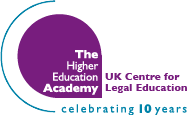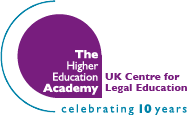Teaching students how to 'think like a lawyer': a comparative approach
Peter Wendel, Pepperdine University
Peter’s session outlined a programme he has pioneered to help students from non-traditional backgrounds engaged in the struggle of ‘learning to think like a lawyer’. His presentation involved the audience in considering a real legal scenario and taking on the roles of the participants in the case. They were asked to decide on the action that they would take as the plaintiff or defendant, and how they would respond to the actions taken by the other side. The session provided a valuable insight into how imaginative teaching really can illuminate legal education.
African-American students often struggle academically in law school and on state Bar exams. This has been a frustration encountered by law teachers in the US for a number of years, and one that I have been trying to address at Pepperdine University in conjunction with its Black Law Student Association (BLSA).
Over time we have developed a program of academic support that has proved helpful. Last year only one BLSA student had a grade point average below 72 (the probation cut-off point at Pepperdine) at the end of the first semester. After working individually with that student he was able to improve his exam performance during the second semester so that his average at the end of the year was above the required minimum, and for the first time in living memory no active Pepperdine BLSA student was dismissed at the end of the first year of law school.
We were interested to see if the success of Pepperdine’s program of academic support for BLSA students was transferable to diversity students in other law schools, given the differing approaches of individual professors.
Description of the problem
The transition from college to law school is a challenging process. Most students begin law school with little idea of what is expected of them academically. They assume that the studying and learning techniques that have worked for them previously will continue to do so. Law school, however, presents three new challenges:
They are asked often for the first time to read cases. Many students lack the skills to do this effectively.
Many struggle when encountering Socratic teaching methods.
New exam techniques are required. Students cannot simply regurgitate the material they learned in class – they are expected to ‘spot the issues’, ‘analyse’ each issue and then properly express their analysis.
Law schools in the US do not offer study skills courses, and students are expected to sink or swim on their own. Non-traditional law students are particularly at risk – they may be the first in their family to attend law school, with few outside resources to draw on for support.
The key appears to be in educating the students not only in developing their research and writing skills but in teaching them to think analytically – ‘like a lawyer’.
The Academic Success Workshop
The Academic Success Workshop consists of two parts. The first part strives to give students an understanding of what it means to ‘think like a lawyer’. Using the natural evolution of a typical judicial opinion, the workshop demonstrates that students need to think on two axes – vertical and horizontal.
On the vertical axis, students need to think on three planes simultaneously – the factual plane, the rule plane and the public policy plane.
On the horizontal (temporal) axis, students need to be able to think in two directions simultaneously – backwards with respect to the facts of the case in question, and forwards with respect to the possible future consequences of the court’s ruling.
The workshop develops this schematic approach logically, putting the evolution of a typical judicial opinion on a timeline and showing how this evolution naturally involves the interplay of the factual, rule, and public policy planes, while forcing students to think in both directions temporally. This also permits the students to visualise the process, which helps to reduce its abstract nature.
The second half of the workshop strives to show the students how ‘thinking like a lawyer’ and being able to spot and analyse issues relates to all stages of their study. It is a multi-step process, and unless they can see how each step inter-relates with the others they are liable to fall off track and never get back on.
The Academic Success Workshop at LILI 2006
Having used the methods described above in law schools throughout the US I was interested to see how it would be received in other jurisdictions. The workshop was presented in what I call the benevolent Socratic approach, adopting a partnership model between the audience and myself. The quality of the academic dialogue depends perhaps more on audience contribution than it does on that of the facilitator. The audience in this case was brilliant, and responded enthusiastically, insightfully, and with humour. The result was an academic dialogue that appeared to engage the audience with both the style and the substance of the presentation.
From a substantive perspective, due to the time restrictions inherent in a conference format, I presented only the first half of the workshop – the proposition that teaching students how to ‘think like a lawyer’ entails teaching them to think simultaneously on three planes. The responses from those in attendance were not that different from those I would have expected from an American audience, leading me to conclude that while there are no doubt differences between the US and UK systems, the core, common law analytical process is the same.
It would be interesting to see how academics in the UK would respond to the second half of the workshop, which postulates that the ability to ‘think like a lawyer’ impacts on all stages of study. It also offers concrete tips for students on how they can improve their ability to read and analyse cases, take notes, prepare for and sit exams.
If anyone has any questions about the workshop or any of the issues raised by it, feel free to contact me at so that we may continue the discussion on e-mail: pwendel@pepperdine.edu.
Biography of Peter Wendel
Peter teaches primarily in the property, and wills and trusts areas of law at Pepperdine University (USA). In addition, he has worked with Pepperdine’s Black Law Student Association (BLSA) to develop an academic success workshop, aimed at helping ethnic minority students in the transition from thinking like a layperson to thinking like a lawyer. The workshop has proved successful, and during 2005 was delivered at a number of BLSA chapters around the country.
Last Modified: 12 July 2010



Comments
There are no comments at this time